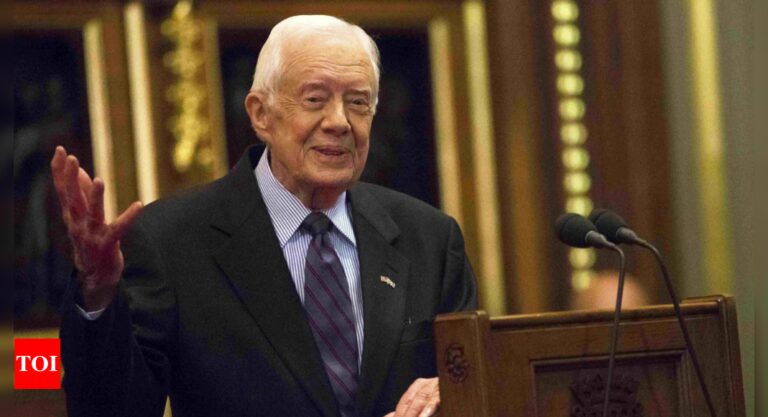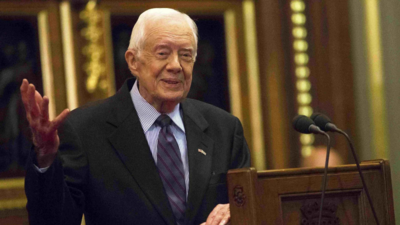Jimmy Carter, the 39th president of the United States, died on Monday at the age of 100. Known for his unwavering dedication to human rights, diplomacy, and public service, Carter’s death marks the end of a remarkable life dedicated to peace and integrity. , and humanitarian efforts.
Here’s a look at Carter’s political journey, from his rise as Georgia governor to his presidency and post-presidency humanitarian work.
Childhood and beginnings of politics
Jimmy Carter was born on October 1, 1924 in Plains, Georgia, a rural town in the heart of the Deep South. Raised in a modest Christian family, Carter’s childhood was shaped by values of hard work, personal integrity, and a deep respect for education. Carter attended the Naval Academy in Annapolis and graduated in 1946. After serving in the U.S. Navy, including a stint on a submarine, he returned to Georgia and took over his family’s peanut farm. The family’s move to the farm helped him connect with his community and the people of Georgia, and laid the foundation for his career in politics.
In 1962, Carter took the first step in his political career when he ran for Georgia State Senate. Although Carter was a political outsider with limited resources, his message of integrity and reform resonated with many Georgians who were tired of entrenched political institutions. He won a seat in the state senate and began his path into the world of public service.
Mr. Carter’s time in the Georgia Senate from 1963 to 1967 was a pivotal period in his political development. He advocated reforms focused on improving education, health care, and the environment. His time in the Senate also shaped his belief in the power of government to effect positive change in people’s lives. But his real political breakthrough came in 1970, when he was elected governor of Georgia.
governor of georgia
The period from 1971 to 1975, when Jimmy Carter served as governor of Georgia, was a period of great change. Based on a platform of reform, he pushed for changes that would modernize the country and make the government more efficient. He advocated for educational reform, environmental protection, and civil rights. One of his most important accomplishments was his push to desegregate Georgia’s public schools, a stance that was progressive and bold for a Southern politician at the time.
Mr. Carter’s commitment to racial equality was evident throughout his tenure as governor. In 1971, he became the first African American appointed to the Georgia State Board of Education. He also worked to expand voting rights for African Americans, given his Southern roots and the racial inequality that had plagued the region for decades. This was a personal cause for him.
Carter’s progressive policies and positions on civil rights won him praise, but also enemies within Georgia’s political establishment. Many saw him as a threat to the traditional Southern political order. Nevertheless, Carter’s reputation as an honest and principled leader continued to grow, and by the time he left the governor’s mansion, he was positioning himself as a potential candidate for high office.
1976 presidential election campaign
In 1976, Carter decided to run for president. At the time, the country was in the midst of a crisis of trust in government. The Watergate scandal shocked the United States and led to the resignation of President Richard Nixon. Americans were disillusioned with established politics, and many were looking for a candidate they could trust, someone who represented integrity, integrity, and a new direction for the country. Mr. Carter, with his background as a political outsider and reputation for integrity, seemed a good fit.
Mr. Carter’s campaign was a study in humility and transparency. He ran as a Washington outsider, promising to restore faith in government. His famous promise to the American people was simple but profound. “If I lie or give misleading statements, please don’t vote for me.” This promise resonated with voters who were tired of the scandals and fraud that had plagued the Nixon administration. I called.
Despite being largely unknown on the national stage, Carter’s grassroots movement gained momentum. He won the Democratic nomination after a tough battle against more established candidates, including George Wallace and Hubert Humphrey. Mr. Carter’s appeal was based on his image as a man of integrity, his status as an outsider, and his determination to restore integrity to the White House. On November 2, 1976, Carter narrowly defeated incumbent Republican President Gerald Ford, winning 297 electoral votes to Ford’s 240 and becoming the 39th President of the United States.
Presidency (1977-1981)
Jimmy Carter’s presidency was met with a series of challenges at home and abroad. Domestically, the country faced an economy plagued by high inflation, rising energy costs, and unemployment. Internationally, the Cold War was approaching, and tensions with the Soviet Union were particularly high over the Soviet Union’s invasion of Afghanistan. In addition, Carter also had to deal with the ongoing energy crisis, the Iran hostage crisis, and the complex politics of the Middle East.
One of Carter’s most lasting accomplishments as president was his role in brokering the Camp David Accords in 1978. The agreement brought together Egyptian President Anwar Sadat and Israeli Prime Minister Menachem Begin, resulting in a peace agreement between the two countries. The success of the Camp David Accords earned Carter international recognition and solidified his reputation as a peacemaker.
Despite this accomplishment, President Carter’s term had significant challenges. The economy struggled with double-digit inflation, and Americans faced long lines at gas stations due to oil shortages. Perhaps the most defining event of Carter’s presidency was the Iran Hostage Crisis, which began in November 1979 when 52 American diplomats and citizens were taken hostage by Iranian extremists. The crisis lasted 444 days and became a symbol of President Carter’s inability to quickly resolve international conflicts.
In 1980, Carter’s image was further tarnished by a failed hostage rescue, and his approval ratings plummeted. Due to a combination of economic hardship and the hostage crisis, Carter lost the 1980 presidential election to Ronald Reagan, who won in a landslide.
After the Presidency and Legacy
Although Carter’s presidential term was relatively short-lived, his post-presidential career has been nothing short of remarkable. After leaving the White House, Carter focused on humanitarian work through the Carter Center, which he founded in 1982. The center focused on global health, conflict resolution, and human rights, and Carter became a leading advocate for eradicating disease, promoting democracy, and society. peace. He also worked tirelessly to monitor elections in emerging democracies and mediate conflicts around the world.
In 2002, Mr. Carter was awarded the Nobel Peace Prize for his work promoting peace and human rights around the world. He became the oldest living president in U.S. history and continued to speak out on issues such as climate change, inequality and global conflict. His ability to bridge political divides and his tireless efforts for peace and justice earned him widespread respect in the United States and around the world.
Despite the criticism he faced during his presidency, Jimmy Carter’s legacy is one of service to humanity. His commitment to foreign affairs, human rights, and public service is a model for future leaders, and his life’s work continues to inspire generations of Americans and people around the world.
Jimmy Carter’s political journey, from his humble beginnings in Plains, Georgia, to the White House and beyond, represents a lifelong dedication to making the world a better place. His presidency may have been difficult, but his post-presidential work cemented him as one of the most respected and beloved figures in American history.



